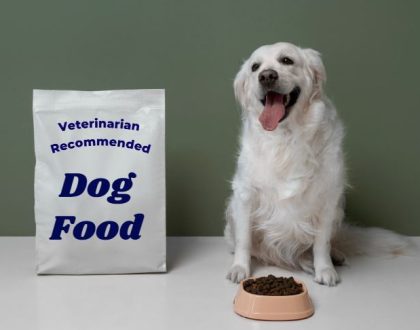
the scientific study of pet nutrition by veterinary nutrition specialists and experts.
Supermarket Surprises: Great Pet Food Options You Can Find at the Grocery Store

Not long ago, I was talking to a dog owner whose dog was healthy, well-muscled, and had a beautiful, shiny coat and I asked her what pet food she was feeding. She seemed embarrassed to answer and finally admitted sheepishly that she was feeding an inexpensive diet purchased from the grocery store. So, she was shocked when I said, “That’s great! It’s an excellent choice for your dog!” Most owners think that that the quality of pet food is directly related to its cost and may feel guilty that they are feeding their pet a lower cost food, but there are some excellent, nutritious diets available at the grocery store that may be a great choice for your pet.
Especially during these challenging economic times, it’s important to be aware that there are some great economical pet food choices you can find at the grocery store (or large retail stores). And you shouldn’t feel guilty about doing so! Just because a pet food costs more doesn’t mean it will provide better nutrition and quality.
But not every food in the grocery store (or pet boutique!) is a good choice. Wherever you buy your pet’s food, it’s critical that the food you select is one made by a manufacturer with strong nutritional expertise and rigorous quality control. And even within a single manufacturer, there are many different products to consider. Should you feed a puppy or kitten food? (yes, if your dog or cat is under 12 months old). Large or small breed? Senior? Lower calorie? The choices can be overwhelming so here are some tips for finding the best diet for your pet.
Tips for finding good quality pet foods at the grocery store:
- Talk to your veterinarian: Your veterinarian can help you by recommending brands and specific formulas that are right for your pet at every price point.
- Medical needs: If your pet has any medical conditions, talking to your veterinarian is even more important. There may or may not be reasonable alternatives to therapeutic diets available in the grocery store, depending on your pet’s specific problem. Don’t make any changes from the recommended therapeutic diet without talking to your veterinarian first, as changes could be harmful to your pet.
- Label logic: Read the nutritional adequacy statement on the label to be sure the food meets the needs of your pet’s life stage. Be aware that the nutritional adequacy statement is often in tiny font on the back or sides of the label, but it’s worth taking the time to find it because it provides some of the most important and objective information on the label.
- Compare costs: The cost of feeding a particular diet isn’t just related to the price of the bag or can of food. To compare costs between pet foods more objectively, check out our Pet Food Cost Calculator.
- Manufacturer facts: While good quality ingredients are essential, there are also many other important factors to consider for your pet’s food. The World Small Animal Veterinary Association (WSAVA) developed recommendations for selecting pet food, including facts such as whether the manufacturer employs full-time qualified nutritionists, if they own their own manufacturing plants, and if they make their products with rigorous quality control procedures. The Pet Nutrition Alliance’s Dare to Ask tool provides information from many manufacturers on some of the WSAVA recommendations. This tool can help you to compare manufacturers based on facts, rather than just on marketing.
If you follow these steps, there are some excellent choices at the grocery store for pet foods that will help you save money and ensure your pet is getting a healthy and nutritious diet.
Want to read more information on feeding your pet?
Subscribe to always know when we add new material!
Recommended Posts

Can Diet Help With My Dog’s Seizures?
January 18, 2024

The Most Popular Holiday Foods…That Your Pet Should Avoid!
December 08, 2023

Veterinarian Recommended Pet Foods: What You Need to Know
November 05, 2023

